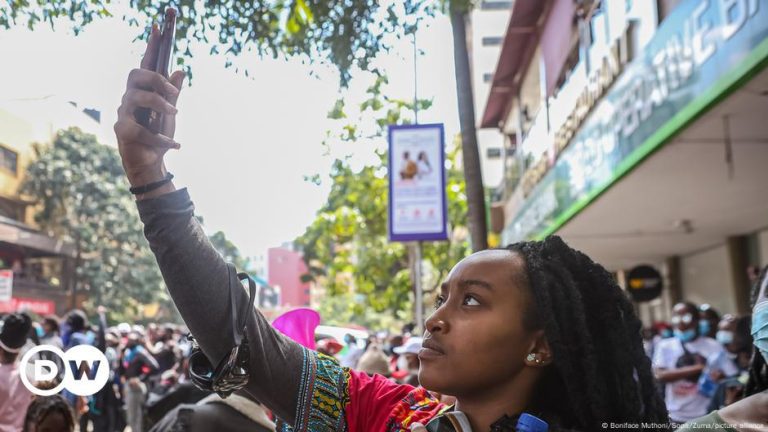Two trends will shape the future of Africa: rapid growth of cities and its youth boom. More than two thirds of the continent’s inhabitants are under 30 years old. And it is predicted that from 2035, most of these young people will live in cities.
This could also change the political situation, says Titus Kaloki, coordinator of the Just Cities project at the Friedrich Ebert Foundation (FES). Kenya.
DW speaks with Kaloki in the German capital Berlin, where he is participating in a workshop organized by FES, the French Institute of International Relations (Ifri) and the German Institute for Development and Sustainability (IDOS) on political participation in African cities and the role of young people.
During the workshop, Kaloki presents photos of Massive protests held in Kenya earlier this year, attended mainly by Generation Z, the generation born between 1995 and 2010.
The protests forced the president William Ruto stop tax increases on bread, oil and gasoline and reshuffle the government.
“So what these Gen Zers were able to achieve is start to demystify complex things like tax laws and legal documents – making them readable, making them understandable, translating them into different languages,” says Kaloki.
The demonstrators had neither a central organization nor a leading figure. Rather, they were motivated by a problem and mobilized via social media.
These young urban dwellers are also increasingly aware of the need to share political context with their peers in rural areas, adding that the movement continues to shift from reactive to proactive, he says.
More susceptibility to populism?
“We can certainly expect to see more protests in the coming decades,” says Lena Gutheil, a Megatrends Africa researcher at the German Institute for Development and Sustainability.
His observation is that young urban Africans avoid formal forms of democratic participation as they rarely vote or join political parties. Instead, young Africans prefer to demonstrate.
It’s an expression of their frustration, Gutheil said. In Africa, only one in six young people have a stable job, while a third are unemployed.
“The feeling of not being part of society” is spreading, because even if the state provides them with support, the difference between their situation and that of wealthy neighborhoods in cities is enormous, Gutheil says.
Gutheil sees this as a danger and expects an increase in “populist appeals” addressed to young people living in the continent’s informal neighborhoods.
Approaching “democracy on an empty stomach”
Kaloki knows life in these colonies well. A 2022 FES study found that these neighborhoods are the result of the colonial division of urban space. Nearly 70% of informal settlements serve an important economic function and are the real engines of growth, he says.
Unfortunately, many are unrecognized, which is why they do not participate in the formal political process, he adds, explaining that residents do not attend municipal meetings and refrain from interacting with local politicians.
As for Gutheil, she believes that “democracy must deliver results so that people are convinced again that the system works, emphasizing that African governments have a duty to provide infrastructure and public goods, for example.
Kaloki focuses on new civic education platforms that explain the importance of participation and how to get involved. But in a comment addressed to European partners, he emphasizes that equitable use of resources is also necessary.
“We practice democracy on an empty stomach,” Kaloki says, adding that honest dialogue on decolonized relations must resume.
Strategic financing is needed
THE European Union must rethink its approach to democracy promotion, says Kaloki, because it is not enough to promote democratic values.
“But there is great potential for strategic financing and design of public goods and services that can result in win-win situations,” he says.
For example, says Kaloki, a European company like Siemens could use EU funds to build rapid public transport in Kenya’s capital, Nairobi. “Not only would they gain in profits, but they would also help the city of Nairobi take a major step forward that would unlock many more economic opportunities and reduce economic losses,” he says.
Better public transport would benefit many people, since almost 40% of the city’s residents currently have to walk, he adds.
There are a lot of issues for the future. “I see hope, but I’m also anxious,” Kaloki says. On the one hand, there is networking and appreciation between people from Nigeria And Ugandawho were inspired by young Kenyans and launchedtheir own protest movementswhich he describes as “a good thing to share in a democratic way”.
However, Kaloki is worried about the authoritarianism that has taken hold in the country. Sahel region following military coups, for example. Democracy in Africa is also under pressure due to the disinformation both online and offline. It will be important to pay close attention to how Gen Z movements mobilize, communicate and protect themselves from misinformation and echo chambers, he says.
This article was originally published in German.


